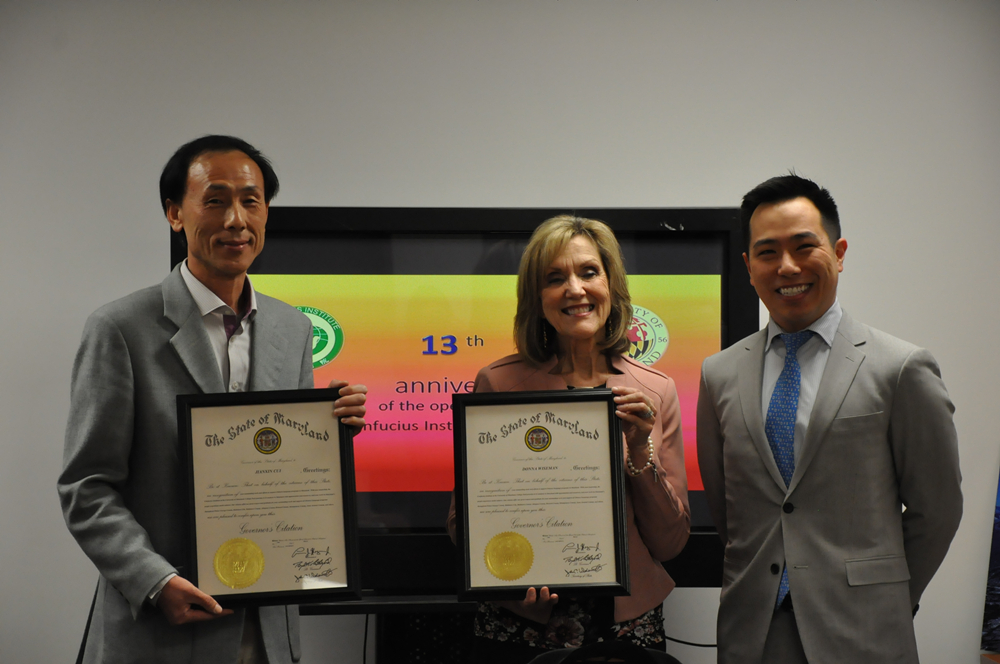First US Confucius Institute turns 13
By Dong Leshuo in Washington | chinadaily.com.cn | Updated: 2018-04-02 06:06

The Confucius Institute (CI) at the University of Maryland, the first Confucius Institute ever in the US, hosted its 13th anniversary of operations on March 28 in College Park.
Representatives from the Maryland state senate, governor's office, local CI recipient schools, CI students and parents attended the celebration to show their support and appreciation for the CI's ongoing contributions to US-China cultural exchange.
Maryland Senator Susan Lee's representative Judge Chung Park expressed Lee's recognition of the work Donna Wiseman and Jianxin Cui, director and deputy director of CI at the university, have done.
In his remarks, Park stressed that Wiseman and Cui's work to promote understanding between different cultures and languages "can make our country better."
"I think it's great that our cultures learn about each other," said Kathleen Connor, district director for Maryland Congressman Jamie Raskin, referring to CI's mission of promoting Chinese language and culture.
Shawn Eum, a policy advisor in the governor's office, also offered support from the governor and presented citations to Wiseman and Cui.
"Being able to know Chinese and English plays a key role not only internationally but even domestically," said Eum. "It really empowers individuals. I know for the governor's office, we are always looking for talented young minds who know more than one language."
Recently, CIs across the country have been facing criticism from US politicians and scholars, who accuse the centers of operating as tools of Chinese propaganda and China's foreign influence operations in the US.
Several US lawmakers have publicly urged CI recipient universities in their states to reconsider or terminate the relationships, including Republican Senators Marco Rubio of Florida and Ted Cruz of Texas, as well as Democratic Representative Seth Moulton of Massachusetts.
"We are not a tool of the Chinese government," said Rebecca McGinnis, coordinator at CI at the University of Maryland, in response to the allegations.
"Several times over the past years we have been criticized for being subjects of propaganda. We simply have to say, ok, you voice your opinion, but we feel that this relationship with China is providing opportunities for language learning and cultural understanding, which is supremely important," McGinnis said.
Sandra Suber, assistant principal at Centennial High School in Howard County, Maryland, lamented the recent widespread skepticism.
"If the Confucius programs are not allowed to continue, we will deprive our students of some wonderful educational opportunities," Suber said.
Patrick McCarthy, world and classical language department chair at Meade High School in Anne Arundel County, Maryland, expressed the same disappointment.
"It has all been about what can we do for the students, how can we make this connection between China and the US a friendly connection. Our teachers promote the culture, there's nothing political in it," McCarthy explained.
A lot of the criticism targets the CI curriculum and textbooks that come from Hanban, the Confucius Institute headquarters, which is a public institution affiliated with the Chinese Ministry of Education.
Some scholarly critics have raised concerns about CI's role in constraining academic freedom on campus by offering a censored and sanitized version of China's story and history.
"I've looked at the texts (of Hanban textbooks)," McGinnis said. "The cultural content is what's important. There is nothing political or dangerous. We also have access to a lot of other materials in the US."
"We follow the Howard county public school curriculum, not just for Chinese language but for all languages," Suber added.
Suber said the CI programs were a way to provide diversity for students and prepare them for future success.
Maxwell Holmes, a CI student who's also a research faculty engineer at the University of Maryland, was heading to a Chinese class after the celebration.
"I love their classes," Holmes said. "They are probably the best structured way I have ever had a language course."
Holmes considered studying Chinese as both a personal challenge he set for himself and something that could help with his future career.
Yian Ke in Washington contributed to this story.
























